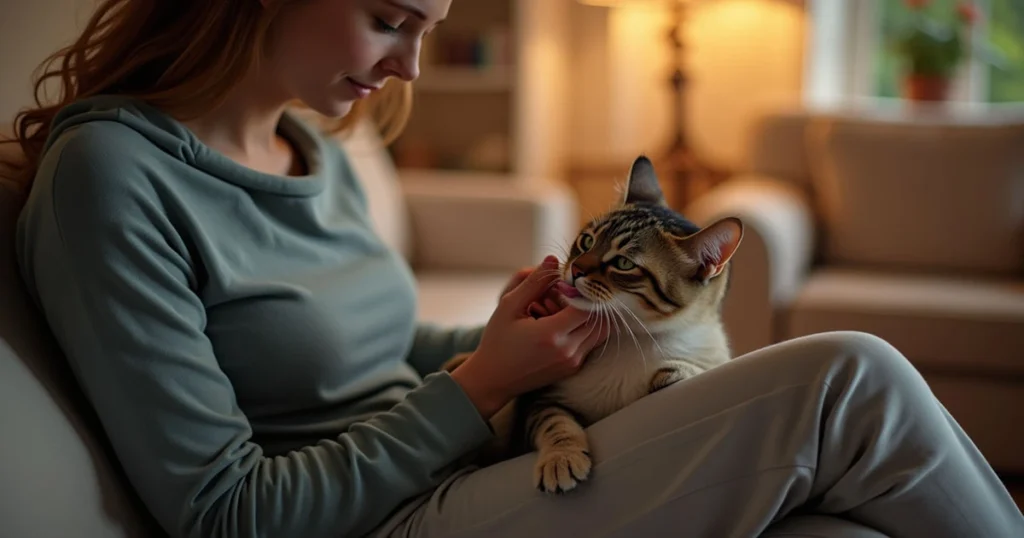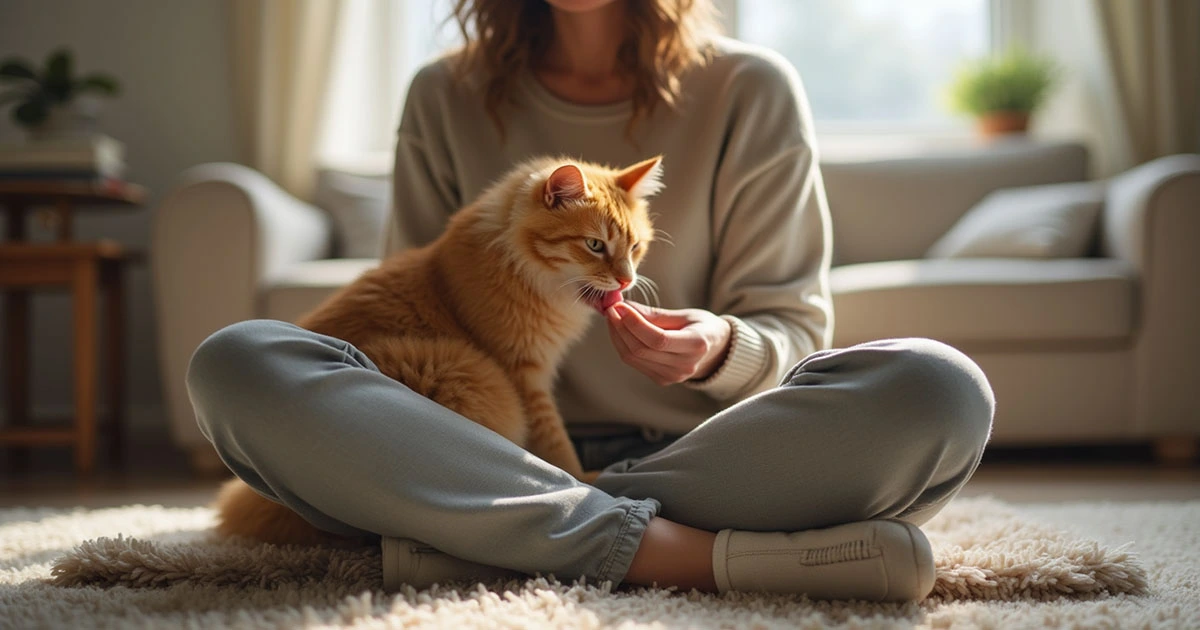Why do cats lick you? If you’ve ever been on the receiving end of your cat’s sandpaper-like tongue, you might wonder what this behavior means. Cats are known for their meticulous grooming habits, but when they extend this to their human companions, it can raise questions. From showing affection to marking their territory, there are several fascinating reasons behind this quirky feline habit. Let’s dive into the six most common explanations for exploring why cats lick their owners.
Table of Contents
Understanding Cat Licking Behavior Basics
Cats are detail-oriented groomers, and their tongues play a vital role in the process. The rough texture of their tongues, with tiny backward-facing barbs called papillae, helps clean their fur. These papillae also cool cats by spreading saliva over their fur.
The Role of Papillae in Cat Tongues
A cat’s tongue is as hard as human fingernails, thanks to papillae. These barb-like structures make grooming effective. They help cats groom themselves and others through allogrooming.
Natural Grooming Patterns in Cats
Cats spend a lot of time grooming, up to 30% to 50% of their day. It keeps their coat clean and healthy. Grooming also helps cats bond with each other.
The Science Behind Feline Licking
Research reveals that licking triggers the release of endorphins in a cat’s brain. This creates a “feel-good” sensation. It explains why cats find grooming comforting and satisfying.
Why Do Cats Lick You?

Cats often lick their human friends, and it’s interesting to know why. This behavior shows their needs and likes. It’s all about natural behavior and social dynamics.
One main reason cats lick us is to show affection and create emotional connections. It’s like how a queen cat licks her kittens. This makes the cat feel happy and content.
Cats also lick to seek attention and initiate playtime. They might find the taste of human skin or leftover food interesting. This behavior can be a sign they want more love and play.
But, too much licking can mean stress, anxiety, or even an underlying medical issue. Watch your cat’s licking closely. If it’s too much, they might need a vet check.
Expressing Love and Affection Through Licking
Cats show love in a special way, and licking is key. It’s all about social bonding and feeling close to their humans. From kitten days to adult life, licking is crucial for these bonds.
Mother-Kitten Bonding Connection
Kittens learn early that licking means love and care. Mother cats groom them to keep them clean and show love. This habit stays with them, making them lick their owners as a sign of affection.
Social Bonding in Cat Communities
In homes with more than one cat, they groom each other. This act, called allogrooming, strengthens their bonds. By licking their owners, cats try to include them in their family circle.
Creating Emotional Connections with Owners
When a cat licks its owner, it’s a sign of deep love. Cats see their owners as family and lick to show affection. This is especially sweet when they lick their owner’s face, just like their mom did when they were kittens.
Marking Territory and Claiming Ownership
When your cat licks you, it might not just be a sign of love. Cats have a way of marking their territory and claiming ownership. By leaving their scent, your cat tells others that you belong to them.
This behavior is like other ways cats show they own something. Licking, cheek rubbing, scratching, and spraying are all part of it. When your cat licks you, it’s leaving its scent behind. This makes you feel like you belong to them.
Cats are very territorial, and licking is one way they show dominance. So, when your cat licks you, it’s not just showing love. It’s also telling the world that you’re theirs.
Attention-Seeking Behavior and Communication
Cats are experts at getting our attention, and licking is a key way they do it. They might want food, play, or just more time with us. This feline attention-seeking behavior shows how much they value our company.
Different Ways Cats Request Attention
Cats use many ways to get our attention, like pawing, meowing, or bringing us toys. Watching how they act and move can help us understand what they mean by licking.
Understanding Your Cat’s Licking Signals
If your cat licks you, they might be asking for a treat or a hug. Paying attention to when and how they lick can tell you a lot. Knowing what their licking signals mean helps us meet their needs and grow closer.
Stress and Anxiety-Related Licking
Licking can be a displacement behavior in cats, helping them cope with cat anxiety symptoms or stress. Cats might lick themselves, objects, or even their owners too much when they’re anxious. Things like changes in their environment, new people or pets, or loud noises can trigger this behavior.
If not treated, anxiety-induced licking can become a compulsive habit. It’s important to find and fix the stress cause to lessen this feline displacement behavior. Creating a calm, stable space, with lots of play and love, can help manage stress-related licking in cats.
Medical Issues and Excessive Licking Concerns
Cat licking is normal for them to groom. But, too much licking might mean there’s a health issue. If your cat is licking more than usual, it could be a sign of discomfort or pain.
If you see your cat licking a lot, or it’s new, it’s time to consult a veterinarian. They can check for any cat health problems that might be causing this behavior.
When to Consult a Veterinarian
Seeing your cat lick too much is a red flag. It’s wise to get a vet’s opinion. They can find out why your cat is licking so much and treat the problem.
Common Health Issues Related to Excessive Licking
There are several reasons why cats might lick too much. These include skin allergies, parasites, hormonal issues, or stomach problems. A veterinarian can diagnose the problem and assist in making your cat feel more comfortable.
Safety Considerations When Cats Lick You
Your cat’s licks might seem loving, but think about cat licking safety and hygiene concerns with cat licking. Cat mouths carry bacteria that can lead to infections if they get into open wounds or cuts on your skin. This is a big worry for people with weak immune systems, like the elderly, babies, or those getting medical treatment.
To prevent infection from cat licks, don’t let your cat lick your face or any open skin areas. Also, watch out for any skin products you use, like lotions or ointments. These can be dangerous if your cat eats them.
Even though the chance of getting sick from cat licking is small, it’s key to stay clean and watch your skin for any signs of trouble. If you’re worried, talk to your doctor or vet. They can give you advice on staying safe and healthy with your cat.
Conclusion: Why Do Cats Lick You?
In the end, understanding the reasons behind the question “Why do cats lick you?” is key to a strong bond and their health. Cat licking can mean many things, like showing love or feeling stressed. By noticing the context and other behaviors, you can meet your cat’s needs better.
While most cat licking is okay, too much might need vet help. Watch for changes in licking and get advice if it doesn’t stop. This helps with understanding cat licking behavior, managing cat licking, and keeping a good feline-human bond.
Learning about your cat’s ways of talking, like licking, can make your bond stronger. By understanding and acting on your cat’s signals, you can have a better, happier relationship. This ensures your cat’s happiness and health.
FAQ
Why do cats lick you?
Cats lick you for many reasons. They might show love, ask for attention, or mark you as their own. They could also be curious or stressed. Knowing why your cat licks can help you understand their feelings better.
What is the role of papillae in cat tongues?
Cat tongues have papillae, tiny spines that clean their fur. These spines also help cool them down by spreading saliva. It’s how cats keep themselves clean and cool.
What are the natural grooming patterns in cats?
Cats devote a large part of their day to grooming, sometimes spending as much as 50% of it on self-care. They also groom each other, especially if they live together. This is a way for them to bond and stay clean.
What is the science behind feline licking?
When cats lick, it releases endorphins in their brain. This makes them feel good. It’s like a natural high that they might enjoy doing again.
How do cats express love and affection through licking?
Licking is a way for cats to show love and build bonds. Mother cats groom their kittens to teach essential grooming skills. This behavior often stays with them, and they may lick their owners as a sign of affection.
How do cats mark their territory with licking?
When your cat licks you, it could be their way of claiming you as part of their territory. This is like other behaviors they use to mark their territory, like scratching or spraying.
How do cats use licking to seek attention?
Cats may lick to get your attention. It’s like pawing or meowing, but with licking. If they get attention for licking, they might do it more often.
How can licking be a stress or anxiety-related behavior in cats?
Licking can be a way for cats to deal with stress or anxiety. They might lick themselves, objects, or even you when they’re feeling anxious.
When should you consult a veterinarian for excessive licking?
If your cat licks too much, or if it’s new, see a vet. Excessive licking could mean they have a skin allergy, parasites, or another health issue.
What are the safety considerations when cats lick you?
Generally, cat licks are safe. But, their mouths can have bacteria that might cause infections. Individuals with compromised immune systems need to exercise caution. Avoid letting cats lick your face or any open skin. Also, be careful of any products on your skin that could harm your cat.

